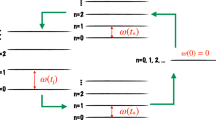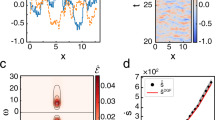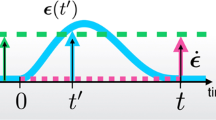Abstract
THE relaxation of systems of gaseous oscillators and the related process of non-equilibrium chemical reaction have recently received detailed consideration. However, while satisfactory formal theories have been presented both for the quantum1–4 and classical5,6 cases, little progress has been made in formulating the detailed transition probabilities which control the time evolution of these systems, and little can be expected in view of the extraordinarily complex nature of the collision process.
This is a preview of subscription content, access via your institution
Access options
Subscribe to this journal
Receive 51 print issues and online access
$199.00 per year
only $3.90 per issue
Buy this article
- Purchase on Springer Link
- Instant access to full article PDF
Prices may be subject to local taxes which are calculated during checkout
Similar content being viewed by others
References
Montroll, E. W., and Schuler, K. E., Adv. Chem. Phys., 1, 361 (1958).
Kim, S. K., J. Chem. Phys., 28, 1057 (1958).
Nikitin, E. E., and Sokolov, N. D., J. Chem. Phys., 31, 1371 (1959).
Gans, P. J., J. Chem. Phys., 33, 691 (1960).
Widom, B., J. Chem. Phys., 31, 1387 (1959).
Widom, B., J. Chem. Phys., 32, 913 (1960).
Author information
Authors and Affiliations
Rights and permissions
About this article
Cite this article
HOARE, M. Fundamental Relaxation of Classical Oscillators. Nature 192, 63–64 (1961). https://doi.org/10.1038/192063a0
Issue Date:
DOI: https://doi.org/10.1038/192063a0
Comments
By submitting a comment you agree to abide by our Terms and Community Guidelines. If you find something abusive or that does not comply with our terms or guidelines please flag it as inappropriate.



